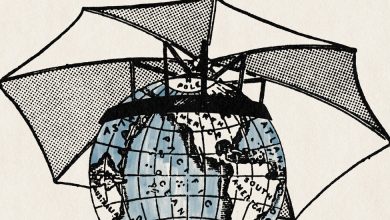To Support Ukraine, Persuade the Elephant

I think quite a lot about persuasion. What is it, exactly, that moves a person from one position to another? Where does one aim one’s efforts for maximum effect? At the head, or at the heart?
One of the most interesting explorations of the art of persuasion comes from New York University’s Jonathan Haidt, who several years ago described the process of persuasion as well as anyone I know. In his book “The Happiness Hypothesis: Finding Modern Truth in Ancient Wisdom,” he compares people’s relation to their emotions to a “rider on the back of an elephant.”
The rider is our rational mind. It’s the part of our brain that deals with facts and reason. It acknowledges, for example, that two plus two equals four, the sky is blue and the Southeastern Conference is the greatest college football conference in the history of the universe.
The elephant is basically everything else about us. As Haidt later explained in an excellent podcast discussion, the elephant represents “99 percent of what’s going on in your mind that you’re not aware of.” By controlling our emotional and social aspects, the elephant controls us far more than we might like; we are, after all, only riders. If the elephant doesn’t want to move, it won’t move. But if the elephant wants to move, as Haidt said on the podcast, “then it is effortless to persuade the rider to go along.” Thus the best way to persuade the elephant and rider to change course is to “reach the elephant first.”
Note that Haidt said, reach the elephant first, not reach the elephant only. Speak to the heart alone, and you may be manipulating more than explaining. To truly persuade a person, you reach heart and mind, elephant and rider, and convince them to move as one.
What does this have to do with aid to Ukraine? President Volodymyr Zelensky was in the United States this week to make a pitch for American aid. Republican support for Ukraine is in decline, and party leaders are so far refusing to vote for aid unless the Democrats agree to Republican demands on border security. While I support a reasonable compromise that funds Ukraine and provides additional border security, there is increasing evidence that many Republicans are simply turning against Ukraine, in both mind and heart. In some G.O.P. circles, there is now outright contempt for the Ukrainian cause.
On Monday, Senator J.D. Vance told reporters, “The idea of flying this guy at the last minute and effectively to badger and guilt-trip us, I just find grotesque.” Later that same day, he said on a podcast hosted by the former Donald Trump chief strategist Steve Bannon, “There are people who would cut Social Security, throw our grandparents into poverty. Why? So that one of Zelensky’s ministers can buy a bigger yacht?”
Last year, I wrote an entire piece trying to explain the new right’s hatred for Zelensky. Donald Trump Jr. called him an “international welfare queen.” Turning Point USA’s president, Charlie Kirk, said Zelensky was “totally corrupt,” while Kirk’s colleague Benny Johnson said the Ukrainian president was an “ungrateful piece of [expletive].” Tucker Carlson said he “dressed like the manager of a strip club.”
Those aren’t geopolitical arguments. Each of these right-wing leaders is speaking to the right-wing elephant using the language of derision and disdain. They’re telling the in-group, “This is how we feel about Ukraine.” I don’t mean to suggest that there are no logical or rational arguments against Ukraine aid. But opposition is now becoming a matter of identity on the right, part of the package of beliefs and values that determines what it “means” to be Republican.
But it’s not enough to decry contempt as a tactic, especially when that contempt seems to be working. Republicans are now 32 points more likely than Democrats to say that our nation is providing too much aid to Ukraine.
While the visceral Republican disdain requires a visceral response, that response should not be to answer contempt with contempt. Nor should it rely exclusively on reaching the elephant. It should endeavor to unify head and heart in a way that is both factually and morally true. At best, our arguments for supporting Ukraine should inspire hope and resolve, not merely trigger fear or rage.
As many readers know, I live outside Nashville, in the heart of MAGA country, and I encounter opponents of Ukrainian aid all the time. I want to share how I try to make the case to their heads and hearts alike.
This week, I was at a lunch meeting with some academic colleagues discussing the grim state of politics and the world. One of the people at the table asked if there was anything that truly gives me hope. I thought for a minute, and I said, “Ukraine gives me hope.” That’s because in the terrible darkness of that war of aggression, we’ve seen the best of liberal democracy and the best of America. I told them a story that I’ve told readers before, of the early morning hours of May 16, when I was in Kyiv for meetings with Ukrainian officials and Russia launched a barrage of Kinzhal hypersonic missiles at the Ukrainian capital.
The Kinzhal is Russia’s superweapon. Russia’s defense minister had said they were “impossible” to intercept. From my hotel, I watched American-made Patriot missiles take off, one by one, into the sky toward them. Thanks to the efforts of my colleagues in Opinion Audio, you can hear the sound of the actual attack in an audio short I recorded after I returned home.
The Russian superweapon turned out to be not that super after all. The Patriot missiles achieved the “impossible” and shot down Kinzhal after Kinzhal. It was an incredible moment to witness, a testament to American ingenuity, industry and fidelity. We are still the arsenal of democracy.
But the story of Ukraine isn’t primarily an American story, as indispensable as we may be. There was something else that I saw: the immense resilience of the Ukrainian people. These men and women were not acting like America’s more disappointing allies, such as the Iraqi or Afghan forces who squandered so much American largess.
The most enduring images of my visit weren’t the explosions high in the night sky, but watching the courage and perseverance of a nation under fire. On the final night, as we approached the train station, I saw the lights of a line of ambulances. Inside those ambulances were Ukrainian casualties, the soldiers who were fighting the brutal forces of a Russian autocrat.
The moral clarity of the moment was blinding. Ukraine is no threat to Russia. It has no capacity to threaten Russian sovereignty. Its only sin was resisting Russian domination, and when Russia could no longer dominate the nation through its chosen puppets, it chose to do so directly, through a brutal attack that recalled the worst wars of the European past.
But the moral clarity goes even deeper than the bare fact of who attacked whom. The fight between Russia and Ukraine isn’t just a fight between nations, but rather a fight between political systems and philosophies. Ever since the advent of liberal democracies, autocrats have believed them to be weak, too soft to prevail in a world that is so often red in tooth and claw.
Autocrats see themselves, by contrast, as possessing a will of iron. They militarize their societies, projecting masculine strength and martial virtue. There are even Americans who fall for their childish, testosterone propaganda. Before the war, the Republican senator Ted Cruz tweeted a contrast between a Russian military ad and an American military ad and commented, “Holy crap. Perhaps a woke, emasculated military is not the best idea …”
To the authoritarian, the dynamics of the Russia-Ukraine fight were clear. On the one side was a strong leader of a mighty Christian nation, commanding legions of hardened soldiers in a holy war against a soft and godless foe. On the other side was the woke, weak West — wealthy and decadent, individualist to the point of self-absorption. How could it find the resolve to battle and die when the real fighting began?
But here we are. Just as Napoleon improperly dismissed Britain as a “nation of shopkeepers” and Germany twice questioned American resolve, so did the Russians underestimate the power of a free people. An autocrat decided to test the West, and he has paid the price in blood and treasure. Estimates of Russian losses are staggering. Roughly 315,000 troops have been killed or injured. To put that number in perspective, the entire prewar army consisted of only 360,000 men and women. It has lost 2,200 of its prewar stock of 3,500 tanks. A declassified American intelligence assessment claims that “the war in Ukraine has sharply set back 15 years of Russian effort to modernize its ground force.”
Under the cold calculus of war, aid to Ukraine is one of the most cost-effective military initiatives in modern American history. At a cost equal to a small fraction of the American defense budget — in 2022, the U.S. spent $812 billion on national defense; since the war began, we have given




